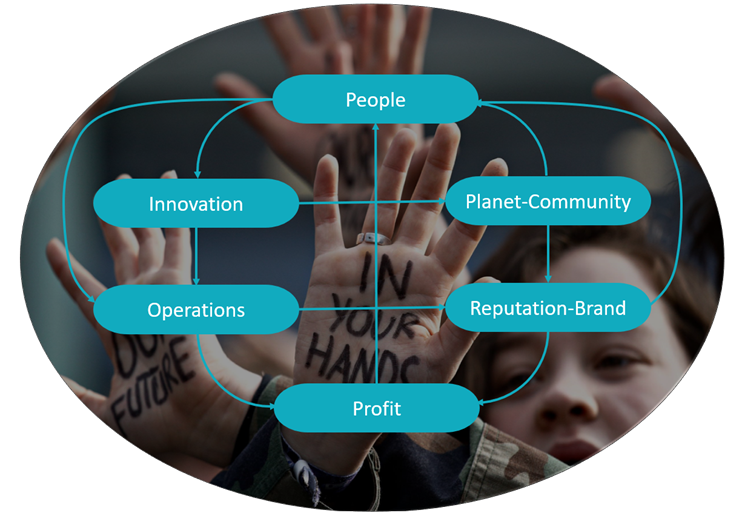Regenerative Businesses as the Building Blocks for a Regenerative Economy
Why a regenerative business?
If you were curious to read this then it’s probable that the answer to the question is greatly understood already. The issues facing the environment and our communities are so stark that we should be demanding intervention. Cries for de-growth, radical dismantling of capitalism and deep adaptation of society will indeed lead to mother nature’s pleasure … but the impact on our communities would be devastating.
We need to find a way to innovate the existing system. The ambition to reach net zero limits the scope of what needs to be achieved – such a vision is one of limiting the damage done by business – a hollow purpose at best. An alternative vision would be one in which society enjoys good growth from business: aligned business value and social value.
This is the focus of regenerative business.
What is a regenerative business?
The idea of regenerative businesses and a regenerative economy builds out from the related ideas of regenerative medicine, regenerative engineering and regenerative economy. Key aspects of regeneration are the following words:
- growing and developing
- enhancing and enriching
- resilient and evolving
- ecological and systemic
Imagine an economy rooted in these descriptions. We would move far beyond notions of sustainability as limiting damage.
A regenerative economy is focused on capital in the same way as conventional economies but embraces the notion of many forms of capital woven together into an ecological system regenerating multi-capitals. Such capitals form the basis of a regenerative business, namely:
- Financial capital – value of money
- Human capital – value of employee skills, commitment and energy
- Innovation and knowledge capital – value of ideas and creativity
- Operational capital – value of how a business does what it does to create products / services
- Reputational capital – value of customer perception and relationship with a business’s products / services
- Natural and community capitals – value of natural resources and communities

As a regenerative system all of these capitals work together to reinforce each other. Using the language of finance these capitals create ‘dividends’ (returns) – if these capitals are invested into then dividends can be expected to flow.
For example, investing in employees (to enhance their skills, or perhaps better conditions of work) can create stronger employee engagement. Strong employee engagement creates a dividend of ideas and creativity (enhanced innovation capital), but also a dividend of quality and productivity (enhanced operational capital), and also a dividend of improved customer service (enhanced reputational capital).
Of note within this regenerative business system is that of natural and community capitals. Investing to enhance the environment or engaging in close partnerships with charities can realise dividends to the business – building employee sense of meaningful work which enhances employee engagement (human capital), and enhanced brand and customer relationships (enhanced reputational capital).
This is a critical aspect of a regenerative business. Communities and the environment are part of doing business, and not a separate aspect that a business addresses through compliance and law, or through a sense of guilt, or desire to enhance reputation as green washing or virtue signalling. With communities and the environment at the heart of business the whole notion of growth is transformed – as a business invests in all six forms of capital so dividends flow and grow – enhancing the environment and our communities, employees, and profits.

How can we build regenerative businesses?
We have been researching this and capture the ideas of regenerative business as Good Growth and Good Dividends. The ideas and tools to build regenerative businesses can be found at www.gooddividends.com. This site is what we describe as a collaboratory: a site of collaboration, and also a site of experimentation as a laboratory - to refine the tools and develop best practices for building regenerative businesses. To date over 150 businesses have participated in using the tools and pursuing the journey towards becoming a regenerative business.
As regenerative businesses become more common – and the evidence base overwhelming – then a regenerative economy can emerge – business value and social value becoming complementary into a virtuous cycle. Indeed a tipping point may occur that begins to shape policy changes for governments to enable a regenerative agenda to become desirable and feasible. It may occur that capital tax allowances are available for investing in employees and communities alongside current allowances for innovation and plant equipment. Maybe society, and therefore politicians, will require of businesses that they have a licence to operate based on the arguments we have outlined for good growth – business value and social value.
In a regenerative economy the role of business, and business leadership, would become elevated to be seen as core and central to flourishing societies.
Becoming a regenerative business is one aspect B Corp Certified organisations consider. QuoLux™ became B Corp Certified in 2023.
If you are interested in joining the Good Dividends project to build regenerative businesses please contact: Professor Steve Kempster or Dr Stewart Barnes.
If you would like to know more about QuoLux™ and B Corp then please contact Rachael Ramos.
Keep up-to-date on the latest leadership and management tips by signing up to our weekly blog here